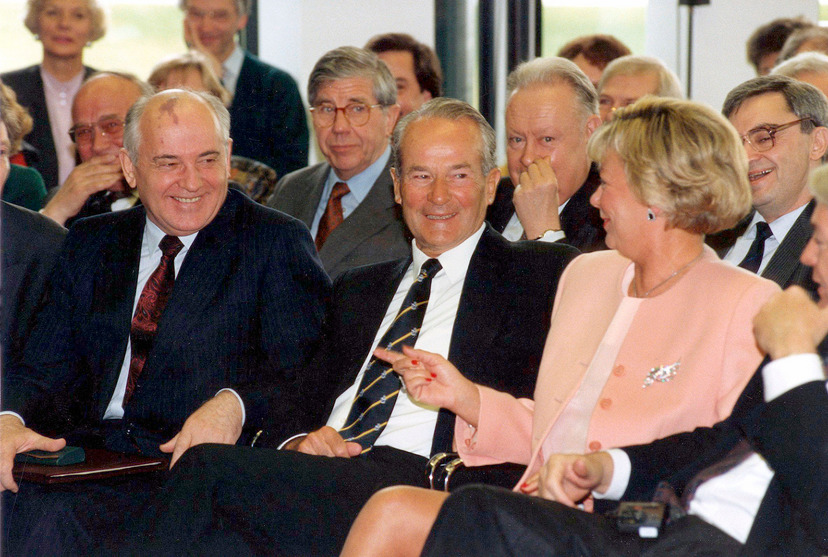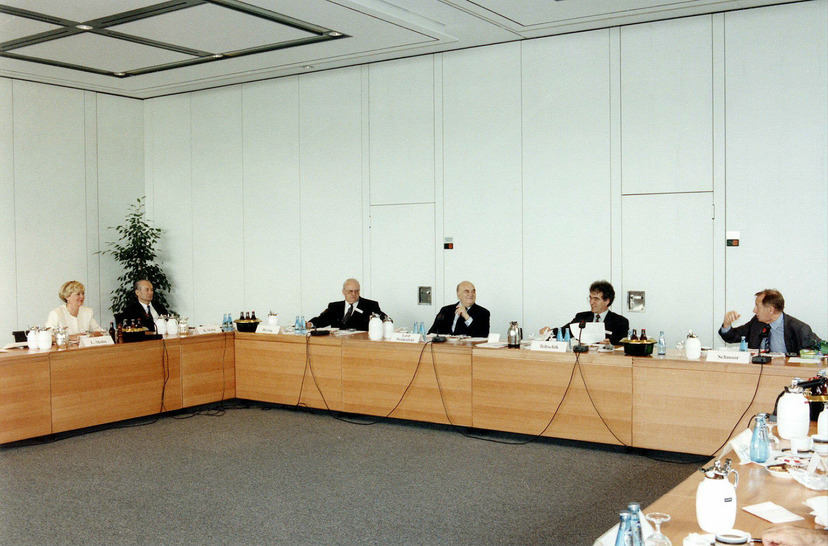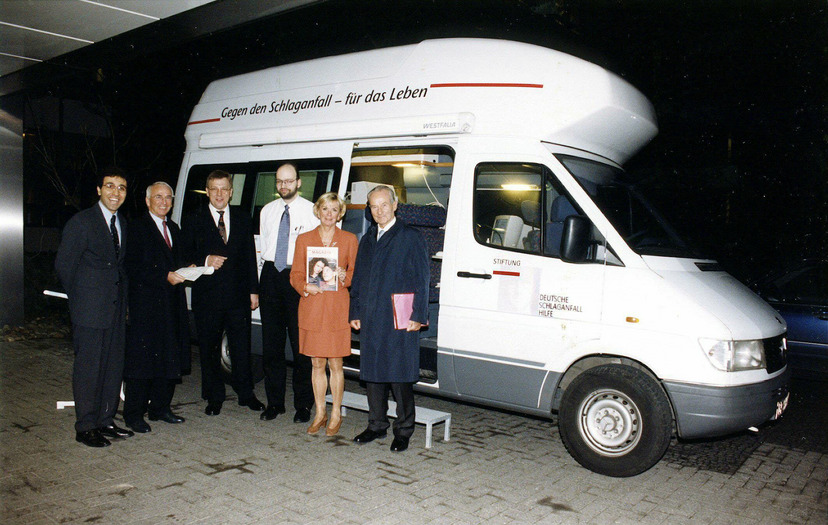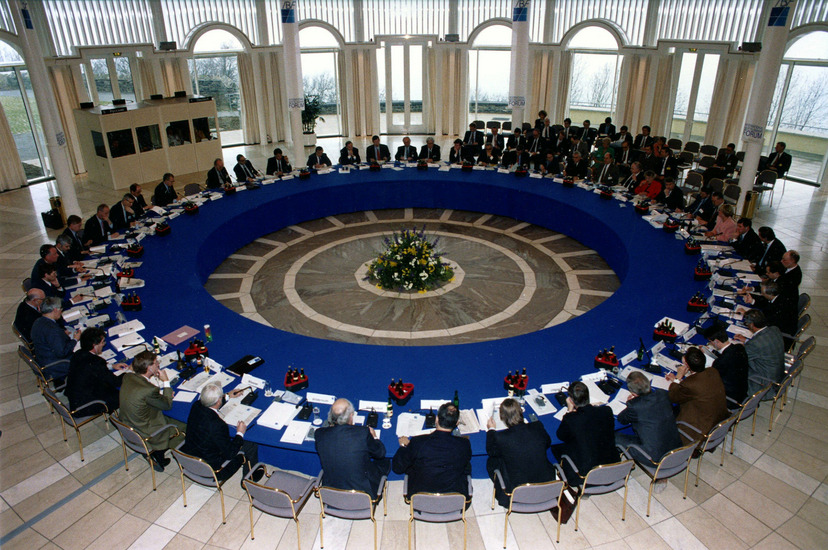Bertelsmann Stiftung hosts Gorbachev
Content

Hartmut Blume
Mikhail Gorbachev in the foyer of the Bertelsmann Stiftung on March 10, 1992. From left: Mikhail Gorbachev, Reinhard and Liz Mohn.
Former Soviet leader Mikhail Gorbachev visits the Bertelsmann Stiftung in his first international trip since the collapse of the Soviet Union. In his role as president and founder of the political foundation bearing his name, Gorbachev comes to Gütersloh to discuss opportunities for partnership and support with the heads of many German foundations.
1992 Carl Bertelsmann Prize: Progressive immigration and integration policy
Migration and its consequences for individual states and societies have become a key issue in international politics. The fall of the Iron Curtain, the establishment of the single European market and the prosperity of Western Europe have made its countries a magnet for immigrants. Effective concepts for managing immigration and integrating non-native newcomers are few and far between. As a result, the jury for the 1992 Carl Bertelsmann Prize unanimously agrees at its January meeting to focus on forward-looking approaches to promoting social cohesion in multicultural societies. The jury awards the 1992 prize to Sweden for its exemplary laws and policy framework in this area.
1st International Bertelsmann Forum: "The Future of Europe: Alternatives – Strategies – Options"
The first International Bertelsmann Forum, held at Petersberg near Bonn on April 3-5, represents the outstanding event of 1992 in the field of international relations. A top-class group of leaders, including ten current and former heads of state as well as the president of the EC Commission, discusses alternatives, strategies and options for Europe in the 1990s.
The International Bertelsmann Forum is intended to offer leaders from politics, business, academia, culture and the media an opportunity for informal dialogue, away from the hustle and bustle of everyday politics. In light of the fragile situation existing across Europe despite the end of the East-West conflict, a pan-European exchange of ideas seems more urgent than ever.
German-Jewish Dialogue launched

Bertelsmann Stiftung
1st German-Jewish Dialogue in the Bertelsmann Stiftung conference space, 1992. From left: Liz and Reinhard Mohn, Roman Herzog, Lord George Weidenfeld, Horst Teltschik and Herbert Schnoor.
The reunification of Germany and the collapse of the Soviet empire have also meant a revival in general awareness of European Judaism.
After more than half a century of separation, several million eastern Jews have reconnected with Jewish communities in the west. This gives European Jews the opportunity to join Jews living in Israel and the Americas as one of the three pillars of the Jewish people. European integration, the peace process unfolding in the Middle East, and the strengthening of Israel’s economic ties to the European Union have made future relations between European Jews, Israel and the new Europe an existential priority. Among the topics the Dialogue will address are education, cultural exchange, the role of the media and interfaith relations. During the very open discussions, the Jewish participants express their own opinions, rather than speaking in the name of organizations or governments to which they belong. They include: Sir Leon Brittan, Lord Rothschild, Lord Wolfson, Professor Peter Pulzer, Lord Justice Woolf and Lord Beioff (UK); Professor Ady Steg, Dominique Schnapper, Beatrice Rosenberg, Pierre Lellouche and Baron Eric de Rothschild (France); Arrigo Levi (Italy); Professor Victor Halberstadt (Netherlands); Prof. Paul Lendvai (Austria); Dr. Mikhail Chlenov (Russia); Mavric Wulfson (Latvia); Justice Foighel (Denmark); Ignatz Bubis and Professor Ernst Cramer (Germany), Lloyd Cutler, Professor Richard Pipes, Professor Joel Fleishman and Martin Peretz (USA); and David Kimche, Arnos Oz, Professor Ben-Ami and Aharon Dovrat (Israel).
Joint initiative on development and prospects for the social market economy
Renewing the social market economy is an ongoing theme in the German political debate
However, current fiscal pressures to reform in individual areas, the objectives of special interest groups and partisan obligations all too often obstruct our view of the need for essential reform. Bertelsmann Stiftung, the Heinz Nixdorf Foundation and the Ludwig-Erhard-Stiftung found the Social Market Economy Initiative in 1992 with the goal of drawing attention to the basic institutional framework for the social market economy within today’s reform dialogue. Projects of the initiative launched by the three foundations target academia, politics, business and the public with steady pressure to renew and modernize the social market economy.
Academy for Manual Medicine begins its work
The goal is to promote the integration of manual medicine into research, teaching and practice. In addition, by demonstrating the cost-benefit effect, the project aims to achieve greater understanding and acceptance of manual medicine among physicians in private practice, a prerequisite for broad availability of qualified manual medicine practitioners. A longer-term goal is to reduce the cost of treatment for diseases of the musculoskeletal system, which now tops the list of healthcare spending. With the Academy for Manual Medicine, the Bertelsmann Stiftung aims to promote the integration of manual medicine into research, teaching, and practice. This profession’s particular concern is to contribute to rapid recovery and prevent invasive intervention through the expert application of manual diagnostics and various conservative therapeutic procedures.
Stiftung Deutsche Schlaganfall-Hilfe (German Stroke Foundation) established

The German Stroke Foundation's first "information mobile" in 1997. Among those pictured: Hamid Emminger and Liz and Reinhard Mohn.
As many as 200,000 people in Germany suffer a stroke each year, and only about 10 percent of them make a full recovery. More than half of stroke victims are of working age. Stroke survivors and their families can feel very isolated, and the level of nursing care required is often high as well. The socioeconomic impact of stroke is considerable. On the medical front, there are still serious deficiencies in regard to recognition, treatment, rehabilitation and social integration. Early recognition of narrowing of the carotid arteries and proper treatment alone could save as many as 50,000 lives each year in Germany. Under the patronage of Liz Mohn, a 1992 Bertelsmann Stiftung project (Neurology) evolves into the German Stroke Foundation.



